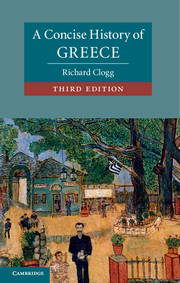Book contents
- Frontmatter
- Dedication
- Contents
- List of Illustrations
- Preface
- 1 Introduction
- 2 Ottoman rule and the emergence of the Greek state 1770–1831
- 3 Nation building, the ‘Great Idea’ and National Schism 1831–1922
- 4 Catastrophe and occupation and their consequences 1923–49
- 5 The legacy of the civil war 1950–74
- 6 The consolidation of democracy and the populist decade 1974–90
- 7 Balkan turmoil and political modernisation: Greece in the 1990s
- 8 Greece in the new Millennium: from affluence to austerity
- Biographies
- The Royal Houses of Greece
- Presidents
- Tables
- Key Dates
- Guide To Further Reading
- Index
8 - Greece in the new Millennium: from affluence to austerity
Published online by Cambridge University Press: 05 June 2014
- Frontmatter
- Dedication
- Contents
- List of Illustrations
- Preface
- 1 Introduction
- 2 Ottoman rule and the emergence of the Greek state 1770–1831
- 3 Nation building, the ‘Great Idea’ and National Schism 1831–1922
- 4 Catastrophe and occupation and their consequences 1923–49
- 5 The legacy of the civil war 1950–74
- 6 The consolidation of democracy and the populist decade 1974–90
- 7 Balkan turmoil and political modernisation: Greece in the 1990s
- 8 Greece in the new Millennium: from affluence to austerity
- Biographies
- The Royal Houses of Greece
- Presidents
- Tables
- Key Dates
- Guide To Further Reading
- Index
Summary
Greece is rich but the Greeks are poor.
Andreas PapandreouDuring the 1990s Greece had one of the fastest growth rates within the European Union, and its status as a fully fledged member of the Union was sealed by acceptance into the eurozone in 2001, with the euro replacing the drachma in 2002. It soon became clear, however, that EU rules relating to the permitted size of the budget deficit had been contravened. Complaints began to be heard about the inflationary effects of the adoption of the new currency, and aggrieved citizens sought to organise an unsuccessful consumer boycott in protest.
There were other indications during the early years of the new millennium of a country on an upward trajectory. After almost thirty years, the incubus of the ‘17 November’ terrorist group was brought to an end. During this time it had carried out with impunity assassinations (twenty-three in all) of US military personnel and spies, Turkish and British diplomats, Greek politicians, policemen, newspaper editors, and members of what the group termed the ‘lumpen big bourgeoisie’, shipowners and industrialists. The British military attaché, Brigadier Stephen Saunders, was the last victim of ‘17 November’ when, in June 2000, he was shot while his car was stuck in Athens’ notorious traffic. His killing prompted British police to assist the Greek authorities in tracking down those responsible. It was not police intelligence, however, but a blunder on the part of one of the members of the group that was to lead to its dismantling two years later. In June 2002, Savvas Xiros was seriously injured by the premature detonation of an explosive device that he was intending to plant in Piraeus. Two safe houses, and much weaponry, were quickly uncovered. Two of Xiros’ brothers were found to be implicated in what proved to be virtually a family (and money-making) enterprise. Unusually, Xiros combined planting bombs with painting religious icons, but it was clear that the principal source of the group’s funding was bank robbery. After several weeks on the run, Dimitris Koufodinas, a bee-keeper-cum-assassin responsible for many of the killings, turned himself in to the police.
- Type
- Chapter
- Information
- A Concise History of Greece , pp. 239 - 263Publisher: Cambridge University PressPrint publication year: 2013



